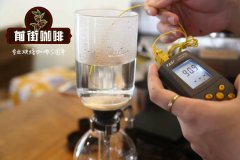Coffee producing areas in Tanzania introduce coffee from Tanzania sour beans? where can I buy Tanzanian coffee?

Professional coffee knowledge exchange more coffee bean information please follow the coffee workshop (Wechat official account cafe_style)
Tanzania Coffee introduction:
When I first arrived in Tanzania, what I couldn't adapt to was currency exchange. Because of the devaluation of the local currency, one US dollar could be exchanged for more than 1,000 local shillings, with tens of thousands of yuan in my pocket at any time. It was easy to become a millionaire here, spending tens of thousands of yuan at least, and you can't get out of the restaurant without tens of thousands of yuan for a meal. Every time you have a shilling in your hand to pay, you have to think about it for a long time. How much is the price in RMB?
After drinking Tanzanian coffee for a long time, especially the small round bean peaberry, the aroma is charming and refreshing, which always impresses people who have drunk it. If you have the experience of coming into contact with the local people of Tanzania, you can feel their simple, frank and enthusiastic national character, which is as impressive as the coffee they produce, and you can experience the different flavor of coffee produced by different nationalities. experience that the same land breeds coffee trees and people.
Tanzania's main coffee producing area, located at the foot of Mount Kilimanjaro, is rich in volcanic soil, and some of the coffee trees planted here are more than 100 years old. coffee was first introduced by Christians from Kenya to grow coffee. Coffee trees must be carefully taken care of, weeded and fertilized.
Moreover, the old branches must be cut off so that new branches can grow again to maintain the quality of coffee beans. The processing factory is located in the nearby town at the foot of the mountain to facilitate the handling of coffee beans, and the equipment of the treatment plant is quite complete. Coffee beans are an important economic crop in Tanzania, and the local government attaches great importance to this industry. the families of farmers who run more farms have all lived here after generations of immigrants, but they are not necessarily local Africans. Farm owners include Indians, Nordic, British, of course, locals, but most of them are small farms, but most of the farms and processing farms are managed by local people. Workers earn their wages by harvesting the amount of coffee fruit. They often see women with children on their backs. In Africa, there are no nannies, and older children have to look after their younger siblings when they reach the age of 5-6. Small farm women will use their hand-made sacks to bring coffee fruits to the farm to collect money.
The coffee beans produced here are all exported from Kilimanjaro, but apart from Mount Kilimanjaro, there are several major coffee-producing areas throughout Tanzania, there are more small farms in other areas, and most small farms also have an area of several hundred mu. Some have their own washing equipment and drying farms, but graded treatment is still through large-scale treatment plants. Tanzania has considerable historical experience in growing coffee, and even small farms can handle good quality coffee beans.
Main Arabica coffee producing areas in Tanzania
Mount Kilimanjaro Kilimajaro Mt. Moshi producing area: mainly on the slopes of Mount Kilimanjaro
Mount Mailu Meru Mt. Arusha producing area
Mbulu producing area of Oldeani
Pare producing area on the highlands south of Lake Nissa near the Malawi border
Robusta coffee is also grown in Tanzania, which was introduced and transplanted from Congo in the early days, mainly in Lake Victoria near the border with Uganda in the west of Tanzania, and mostly sold to Europe, but the coffee grown in Tanzania is mainly Arabica.
The economy of Tanzania is not prosperous, most of the people still rely on agriculture, and not a small number of people are engaged in the coffee industry. another major source of money depends on the tourism income brought by wild animals, the natural resources of the country. The Maasai people in Tanzania are naturally free to approach nature, because they are unwilling to accept the shackles of civilization and work, but can retain the most primitive customs of the nation. Even if many Maasai are educated, those who can speak a little English can find a good job. Interestingly, the vast majority of Maasai are born the best guards because they are unwilling to do service-oriented work. In many local restaurants, restaurants, companies have hired a Maasai as a guard, 24-hour guard three months only once a week to a month off, quite competent.
On coffee farms and processing farms, we can see many women working in coffee to support their families, hand-picking coffee grades, and chatting while they are working. The local people are contented by nature, and we only use a few candies to share. To build a friendship with everyone. Labor in Tanzania is cheap, so much of the work of pruning and maintaining coffee plantations in Tanzania depends on manual processing rather than machines. Coffee has grown but is still green, when the busy season has not yet arrived, the job of coffee workers is to manually check to pick the leaves of some sick or worms. Basically, coffee processing in Tanzania is highly dependent on labor, but it also brings job opportunities for locals and increases household income.
Africa is not only a paradise for wild animals, but also a paradise for coffee lovers. A large number of high-quality, lively and unrestrained coffee beans are produced in this land full of vitality.
This Tanzania Kilimanjaro coffee bean is a round bean (Peaberry) from 3000 ∼ 6000 feet of Mount Kilimanjaro, the highest peak in Africa. Traditionally, Tanzania's round bean coffee, like Kenya's round bean coffee, is the most sought-after product in the international market.
Using medium-light baking, in terms of flavor, it emits complex aromas of roses, citrus, berries and sweet plums in the fresh and natural fruit acidity; the palate is fresh and energetic, with rich and round multiple layers. and caramel-like sweet and calm taste, make people immersed all day!
Important Notice :
前街咖啡 FrontStreet Coffee has moved to new addredd:
FrontStreet Coffee Address: 315,Donghua East Road,GuangZhou
Tel:020 38364473
- Prev

Description of Taste and Flavor of tanned Coffee in Tanzania varieties and treatments of Tanzanian coffee beans
Professional coffee knowledge exchange more coffee bean information please follow the coffee workshop (Wechat official account cafe_style) Tanzanian coffee this is a good introduction to sun-cured coffee is not sour and does not have an unpleasant fermented taste! Tanzania 28 days full-sun oak barrel fermentation bourbon species! A little bit about whether the raw beans in Tanzania are different from those in Kenya.
- Next

Is the Indian Bengal tiger boutique Robusta coffee beans delicious? Robusta Robusta is really bad.
Professional coffee knowledge exchange more coffee bean information please follow the coffee workshop (Wechat official account cafe_style) Robusta Coffee introduction: mentioned Robusta this variety, but seems to have more negative comments? Obviously all kinds of coffee, is he doomed not to turn over? Although Robusta is one of the three major varieties of coffee, but his dye
Related
- Detailed explanation of Jadeite planting Land in Panamanian Jadeite Manor introduction to the grading system of Jadeite competitive bidding, Red bid, Green bid and Rose Summer
- Story of Coffee planting in Brenka region of Costa Rica Stonehenge Manor anaerobic heavy honey treatment of flavor mouth
- What's on the barrel of Blue Mountain Coffee beans?
- Can American coffee also pull flowers? How to use hot American style to pull out a good-looking pattern?
- Can you make a cold extract with coffee beans? What is the right proportion for cold-extracted coffee formula?
- Indonesian PWN Gold Mandrine Coffee Origin Features Flavor How to Chong? Mandolin coffee is American.
- A brief introduction to the flavor characteristics of Brazilian yellow bourbon coffee beans
- What is the effect of different water quality on the flavor of cold-extracted coffee? What kind of water is best for brewing coffee?
- Why do you think of Rose Summer whenever you mention Panamanian coffee?
- Introduction to the characteristics of authentic blue mountain coffee bean producing areas? What is the CIB Coffee Authority in Jamaica?

